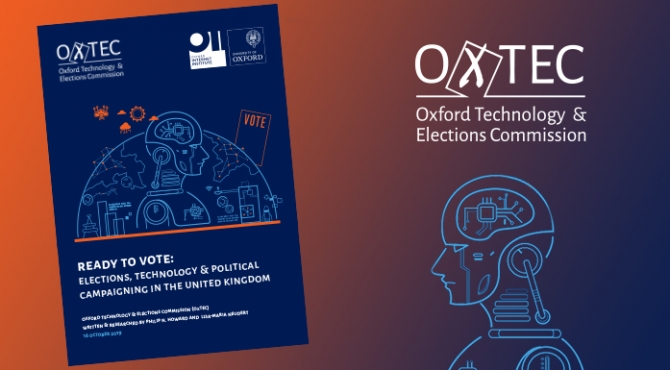 Should we accept that the current social media model is incompatible with a healthy democracy?
Should we accept that the current social media model is incompatible with a healthy democracy?
Social media has changed the nature of democratic conversation, argues Andrew Marantz [@andrewmarantz], author of Anti-Social: Online Extremists, Techno-Utopians, and the Hijacking of the American Conversation. The United States has never resolved the question of how a multi-ethnic democracy talks to itself, he told a forum at Politics & Prose, a Washington, DC, bookstore.
 “To change how we talk is to change who we are,” he said. social media fragments political discourse and in the absence of a common shared truth, interlocutors are quick to anger and dialogue calcifies.
“To change how we talk is to change who we are,” he said. social media fragments political discourse and in the absence of a common shared truth, interlocutors are quick to anger and dialogue calcifies.
Marantz argued that “noxious language online is causing real-world violence” in a recent article for the New York Times, entitled ‘Free Speech Is Killing Us’. Freedom of expression is an essential element of political pluralism , but there is a problem with free speech absolutism, he told NPR.
Enabled by the rise of social media, some internet denizens, colloquially known as “edge lords,” are working to destroy reasonable online discourse, he argues, drawing on his research into a group of “nihilists, right-wing nationalists, conspiracy purveyors, white supremacists and more” who promote right-wing memes and fake news on Facebook and other social media platforms.
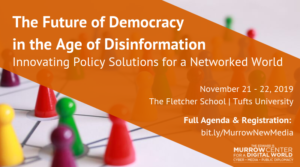 The Oxford Technology and Elections Commission (OxTEC) this week published a report saying that Britain needs to take immediate action to reduce the risk of malicious actors online ahead of the looming general election.
The Oxford Technology and Elections Commission (OxTEC) this week published a report saying that Britain needs to take immediate action to reduce the risk of malicious actors online ahead of the looming general election.
‘Ready to Vote: Elections, Technology & Political Campaigning in the United Kingdom’ (above), co-authored by Professor Phil Howard, Director of the Oxford Internet Institute (OII) and lead researcher Lisa-Maria Neudert, makes a series of recommendations aimed at securing the information infrastructure of elections and creating a trusted environment for the democratic use of technology:
- Government – Relevant government agencies should meet regularly and establish a mechanism for the Electoral Commission to verify campaigners and ensure appropriate legislation is in place to track campaign expenditure
- Political parties – They should develop a code of practice for the use of third-party data and provide the Electoral Commission with details of commercially purchased data and imprints disclosing information about campaigners.
- Industry – Social media platforms should create a full advertising archive freely accessible to all and provide the Electoral Commission with reports on content moderation and takedowns
- Civil Society – External firms to conduct audits of social media companies and their practices that reflect expectations from election administrators. Identify data needs required to devise on shortcomings and risk of social networks.
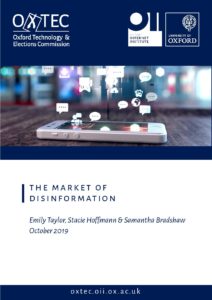 Download the full report here.
Download the full report here.
“The Market of Disinformation,” an analysis from Oxford Information Labs, examines the effect of algorithmic changes made by social media platforms, designed to counter disinformation, through the lens of digital marketing, and highlights techniques used by campaigners to attract, retain and persuade online audiences.
In an attempt to clarify its rules, Twitter said Tuesday it would take enforcement actions against “any account” in certain, dire circumstances, including instances when a world leader threatens a user with direct violence or publishes private information, such as a home address, the Washington Post reports. Sen. Elizabeth Warren of Massachusetts, who has proposed breaking up Silicon Valley giants, has called Facebook a “disinformation-for-profit machine.”
Social media has become weaponized, says London-based start-up Astroscreen. Founded by Ali Tehrani, the company wants to help governments and companies deal with disinformation, using artificial intelligence to seek out fake accounts online, before deploying analysts to get to the route of the problem, the Evening Standard reports:
The start-up uses a series of AI models to monitor topics online and detect suspicious activity. For instance, Brexit. “Say I wanted to create 1,000 accounts to spam a topic like Brexit. It’s difficult to come up with 1,000 unique usernames on Twitter so I might create an algorithm to create usernames using this pattern,” says Tehrani. “We have a model that detects username similarities, that is highly suspicious.”
Astroscreen aims to dig out fake political movements and expose their true motives. “It’s happened for a long time, but social networks have allowed it to happen at scale,” explains Tehrani.
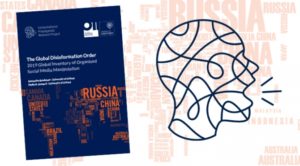 If we do not allow — or at least, try to prevent — bogus advertising of all kinds of products or services, why should politics be a rules-free zone? analyst Enrique Dans asks. And if the conventional media can’t be a rules-free zone, why should the social networks? he writes for Forbes:
If we do not allow — or at least, try to prevent — bogus advertising of all kinds of products or services, why should politics be a rules-free zone? analyst Enrique Dans asks. And if the conventional media can’t be a rules-free zone, why should the social networks? he writes for Forbes:
Should we accept that the current social media model is incompatible with a healthy democracy? Does it make sense, given that social platforms claim not to be able to prevent lies and manipulation during electoral campaigns, to force them to ban all political advertisements? Should we impose limits on social media advertising and prevent political parties or candidates from using them to try to win votes?
Disinformation is a major factor in growing disillusion with democracy in Latin America, according to a recent survey.
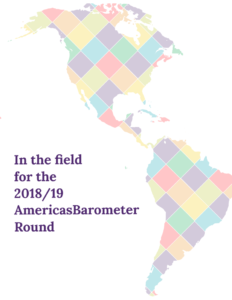 It would be extremely helpful if tech giants like Facebook, WhatsApp, Google and Twitter could work with local fact-checkers, said David Hidalgo, the founder and content director of OjoPúblico, a digital Peruvian venue focused on investigative journalism that also runs a fact-checking initiative called OjoBiónico.
It would be extremely helpful if tech giants like Facebook, WhatsApp, Google and Twitter could work with local fact-checkers, said David Hidalgo, the founder and content director of OjoPúblico, a digital Peruvian venue focused on investigative journalism that also runs a fact-checking initiative called OjoBiónico.
“Right now, Peru could be used as a real life lab where these companies could experiment with some of their ideas to fight political disinformation in a polarized context,” he told Poynter.
“Peruvian citizens are just starting to understand mis/disinformation as something that can have an impact in real life. Dealing with it is also a question authorities must answer. And I don’t have any information about an official program to fight false news.”
The William and Flora Hewlett Foundation, based in Menlo Park, California, seeks a Program Officer for the Madison Initiative on U.S. democracy who will lead the foundation’s efforts to combat digital disinformation and improve campaigns and elections in the United States. Deadline 10/18/2019. Full details here.







